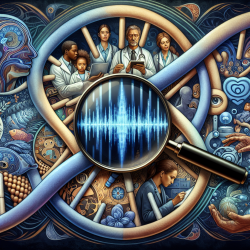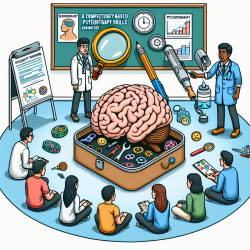Understanding the Complexities of Landau-Kleffner Syndrome in Autism
As a practitioner working with children with Autism Spectrum Disorder (ASD), the challenge of differential diagnosis is a familiar one. One particularly complex scenario involves distinguishing between Landau-Kleffner Syndrome (LKS) and post-encephalitis syndrome in children with ASD. A recent case study published in Cureus sheds light on this intricate diagnostic process, providing valuable insights for practitioners.
Case Study Overview
The research article, Differential Diagnosis of Landau-Kleffner Syndrome Versus Post Encephalitis Syndrome in a 13-year-old Boy With Autism Spectrum Disorder, discusses the case of a 13-year-old boy with ASD who exhibited symptoms that could be attributed to either LKS or post-encephalitis syndrome. The boy experienced developmental regression, loss of language skills, and seizures following a tick bite, which initially suggested tick-borne encephalitis (TBE).
Key Findings
Through extensive diagnostic testing, including EEG, MRI, and PET-CT scans, the researchers were able to rule out TBE and confirm a diagnosis of LKS in conjunction with ASD. The EEG findings showed epileptiform activity, and imaging studies revealed abnormalities in the left temporal lobe, consistent with LKS.
Implications for Practitioners
This case highlights the importance of a thorough and multi-faceted diagnostic approach when dealing with complex neurological and developmental disorders. Here are some key takeaways for practitioners:
- Comprehensive Testing: Utilize a combination of EEG, MRI, and PET-CT scans to differentiate between LKS and other neurological conditions.
- Consider Overlapping Symptoms: Be aware that symptoms of LKS, TBE, and ASD can overlap, making diagnosis challenging.
- Genetic and Environmental Factors: Keep in mind the potential role of genetic predispositions and environmental triggers in the development of LKS.
- Collaborative Approach: Work closely with neurologists, psychiatrists, and other specialists to ensure a comprehensive evaluation and treatment plan.
Encouraging Further Research
While this case provides valuable insights, it also underscores the need for further research into the etiology and treatment of LKS, particularly in children with ASD. Practitioners are encouraged to stay informed about the latest developments in this area through continuous education and collaboration with research institutions.
To read the original research paper, please follow this link: Differential Diagnosis of Landau-Kleffner Syndrome Versus Post Encephalitis Syndrome in a 13-year-old Boy With Autism Spectrum Disorder.










